 A new study has shown that men and women who take Rogaine® (Minoxidil) to treat hair loss might want to consider keeping the aspirin bottle capped. A research team at the University of British Columbia has found evidence that the popular anti-inflammatory medication may suppress the same enzymes that Rogaine seeks to stimulate, thereby negating the effect of the popular hair loss treatment. This discovery is potentially alarming for many Rogaine users, as daily Aspirin use is widely promoted by physicians as a safe way to improve cardiovascular health and reduce the chance of heart attack and stroke.
A new study has shown that men and women who take Rogaine® (Minoxidil) to treat hair loss might want to consider keeping the aspirin bottle capped. A research team at the University of British Columbia has found evidence that the popular anti-inflammatory medication may suppress the same enzymes that Rogaine seeks to stimulate, thereby negating the effect of the popular hair loss treatment. This discovery is potentially alarming for many Rogaine users, as daily Aspirin use is widely promoted by physicians as a safe way to improve cardiovascular health and reduce the chance of heart attack and stroke.
In light of this recent finding, men and women who regularly use Rogaine may wish to find alternative methods of improving cardiovascular health. Alternatively, hair loss sufferers may elect to continue taking Aspirin and choose to restore areas of balding scalp via hair transplant. Unfortunately, evidence suggests one can no longer do both.
How Rogaine® Works
Minoxidil, available by the brand name Rogaine, is one of the most widely used non-surgical treatments for hair loss. Though it is still unclear exactly how the topical foam suppresses hair loss, many studies indicate that Rogaine stimulates the production of a very special enzyme called cyclooxygenase1, or COX-1. As the production of COX-1 increases, so too does the production of prostaglandin E2, or PGE2.
Increased levels of PGE2 has a very positive impact on the overall health and functionality of hair follicles, and in some cases may reverse the process of hair miniaturization. Hair miniaturization is characterized by the inability of hair follicles to sustain natural hair growth, a phenomenon that may eventually lead to pattern baldness, or androgenetic alopecia. In this way, Rogaine is thought to reverse the signs of hair loss by stabilizing hair follicles through increased production of PGE2.
How Aspirin May Hinder the Effects of Rogaine
Unfortunately, a ground-breaking new study released by the Department of Dermatology and Skin Science at the University of British Columbia demonstrates that Aspirin may negate the effects of Rogaine, simply by acting as an anti-inflammatory. Specifically, Aspirin suppresses the synthesis of certain prostaglandins by actively shutting-down cyclooxygenase enzymes like COX-1.
Just as Rogaine seeks to stimulate COX-1 production to improve hair growth, Aspirin disables COX-1 to fight inflammation.
Alternative Hair Loss Treatments
Fortunately, there are alternatives to Rogaine that may restore areas of balding scalp with all-natural hair. Two leading methods include follicular unit extraction (FUE) transplant, and a robotics-assisted transplant with the all-new ARTAS® System.
FUE Hair Transplant. FUE transplants are conducted by highly qualified surgeon. The scalp is anesthetized prior to the procedure, so almost no pain is experienced by the patient. Individual clusters of hair follicles are then removed from the patient’s own scalp, using a minimally invasive “punch” instrument that measures only a few millimeters in diameter. The surgeon then separates the clusters into pairings of 1-3 hairs and expertly transplants them to the area of balding scalp, by hand.
ARTAS® System Transplant. The Hair Transplant Institute of Miami has recently become 1 of fewer than 20 clinics to offer the revolutionary new ARTAS System, the first ever FDA approved robotics technology for FUE transplant procedures. Using the ARTAS, our surgeons are able to perform FUE transplants with more quickly, with greater accuracy and precision. Recovery time is faster than ever, and the end-result is incredibly natural in appearance. Learn more about ARTAS hair transplants in Miami.
This exclusive health report has been published by the Hair Transplant Institute of Miami. For additional information or appointment requests, please call toll-free 1-877-443-9070.

